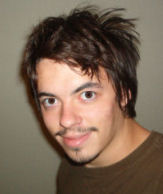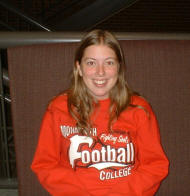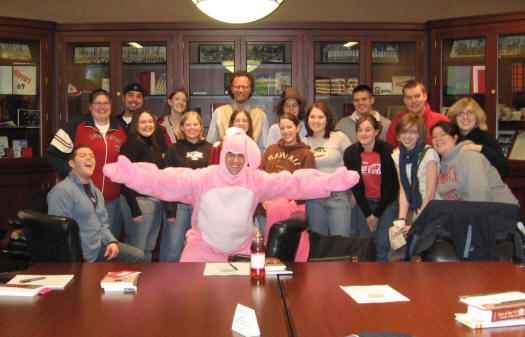|

|
|
|
Google
Scholar

by Johnathan Skidmore
While living on Monmouth
College campus, students have access to many different scholarly
search engines. Many of these engines, such as the OED and
EBSCO hosts, are only available when viewed on a computer
connected to the campus network. When you have graduated,
heaven forbid, or when you find yourself at home on break, these
important sources are not available. Now, while these online
sources are never a perfect replacement for an actual library
staffed by competent librarians, a library is not always the
most realistic option due to location and time constraints.
What is a poor college student or graduate to do? Subscriptions
to these sources are incredibly expensive and usually only
available to large groups and organization. Google is
attempting to remedy this situation.
Google, now the most
popular search engine in the United States, began officially in
1998 and was initially run out of a garage by Larry Page and
Sergey Brin, two Stanford University graduate students. Prior
to founding Google, the two colleagues ran a search engine
called BackRub out of their college dormitory rooms in 1995.
Since then, Google has expanded greatly. In late December of
2004, Google reached an agreement with the libraries at
University of Oxford, Harvard University, Stanford University,
the University of Michigan, and the New York Public Library in
order to form a program referred to then as Google Print. This
program eventually became known as Google Book Search and is now
known as Google Scholar. Basically, this program is very
similar to JSTOR, but its ultimate goal is to remain free to the
public.
This marks a new
chapter in the availability of copyrighted information. No
longer will you have to pay in order to search through print
research materials, or at least that’s the goal. In agreement
with the libraries mentioned before, Google Scholar now allows
the user to search through nearly every book contained in the
libraries in a format similar to that of a PDF format or those
used in JSTOR articles. Every page of every book contained
within these libraries will eventually be scanned and organized
so that an entire book located in the Harvard library might be
read on a computer in Monmouth, IL. Google Scholar search
results may include anything from classic literature, scholarly
journals and articles, and even pulp fiction.
This may seem like a
researcher’s dream, but Google Scholar is still far from being
complete. Currently still in its beta testing stage, Google
Scholar is not yet a complete database and yields limited
results, but if it is as powerful upon its completion as the
Google developers plan, it will easily become the most powerful
search engine available. As interest in Google Scholar has
picked up, so have the sources. Many publishing houses and
companies have submitted their works to be scanned into the
Google Scholar database. As a result, Google has placed several
requirements on what they will accept for their database. These
requirements are designed to help aid in faster searching and
indexing of material as well as making the researching process
as easy on the user as possible. For this reason, all articles
must come with a complete abstraction of the work, a list of
works cited, and a proper citation for the piece.
Keep watching this
source and it should prove to be invaluable in the future. If
you would like to try out the beta version of the Google Scholar
it is available
at the following link. Overall, since this is still an
incomplete database, JSTOR and EBSCO hosted academic search
engines are still the better online sources of information, but
it is comforting to know that a free and powerful alternative is
in the works. Soon, we shall see whether or not Google Scholar
is able to its company tagline and help the scholar “Stand on
the shoulders of giants.”
|
|
|
The Literature
Resource Center

by Megan Carlson
Have you ever wondered what your favorite
writer's inspiration was for writing his New York Times
bestseller? Have you ever not been able to sleep because
you just have to know what the heck (insert your least favorite
writer) is talking about? If you have answered yes to one
or both of these questions, you will find a mass array of
integral information on the
Literature Resource Center.
This is almost like the National Enquirer, but for bloodthirsty
English enthusiasts. In addition to being a source of
entertainment and information into their personal lives, it also
gives valuable resources such as articles on literary criticism,
bibliographies, and even a literary-historical timeline.
When I got to the website the first thing that
caught my eye was a quote by Peter Abelard. This is what
he says, "Against the disease of writing one must take special
precautions, since it is a dangerous and contagious disease".
This was written to a lady named Heloise. Ultimately I was
intrigued and decided that he would be my victim. It is
very easy to search on this database. You put in the
author you choose to research and it provides you with all of
the information. I typed in Peter Abelard and got a general
description of him. He was French and was extremely
popular in his day (circa 1079-1142). I proceeded with
reading a biography that told me all I needed to know about
Heloise. She had a child with Abelard before they were
married, but Abelard was castrated by one of his attendants.
A tragic story indeed. Heloise became a nun, and Abelard
entered an abbey in Paris. He also was a teacher whose
students included three popes and several heads of states.
This is very much the good gossip that many people like to learn
about celebrities of their time like Abelard. In addition
to this, I checked literary criticism and found 8 articles.
These articles provided me with information mostly about his
essays. His works include "Sic et Non" and "Historia
Calamitatum". The essay "Historia Calamitatum" means
"The Story of My Misfortunes", and is about his own personal
life. He was very much a philosopher who gradually began
to doubt his religion.
The information that I found on the Literature
Resource Center on Peter Abelard was very interesting to me.
I had not heard of him before reading the quote on the first
page of the database. In addition to finding out
information about Authors, you can look up literary words you do
not understand, check to see if your favorite author is coming
close to town, or see what else was going on when your author
wrote his works. I highly suggest this database. It
is full of valuable information that will benefit papers, and in
general, your own knowledge of the writer.
The information found about Peter Abelard's
life and works is at:
"Peter Abelard," in Dictionary of Literary
Biography, Volume 115:
Medieval Philosophers. A Bruccoli
Clark Layman book. Ed. by
Jeremiah Hackett, University of
South Carolina. The Gale Group,
1992, pp.3-14.
|
|
English Theme
House
Several students of Monmouth College are
attempting to establish an English theme house on campus.
The two English majors heading up these attempts are Luke Gorham
and Ryan Gutierrez. Originally the plan was to have
between eight and ten people living in the theme house, but the
petition that they need filled out only allows for seven.
They are currently at six subscribers.
Though they haven't been
able to pick out an actual building for their house yet, the two
have their eye on the old Service House that is currently
housing the Science House and the new Service House, but they
have noted that they would be happy with whatever they could
get. The tentative requirements to live in the English
theme house are as follows:
-
Applicant must be an
English major or minor
-
Applicant must have a
GPA of 2.5 or higher (preferably 3.0 or higher)
-
Applicant must be
willing to commit to several English-related projects that
will occur throughout next year.
Anyone who is interested
should contact
Luke Gorham or
Ryan
Gutierrez. They are currently looking for one
more person to sign their petition. |

-
ACM Visiting
Scholars Initiative Presentation, 7 p.m. Thursday, March 2, Dahl
Auditorium:
HOW
DID I GET THAT?:
Or, WHAT I LOOK FOR WHEN I GRADE YOUR PAPERS
*INSIGHT INTO COMPOSING PAPERS THAT MEET YOUR INSTRUCTORS’
FORMAL AND CONCEPTUAL CRITERIA*
Dr. Jean Ketter, professor of Educational
Studies at Grinnell College will explain what goes through
professors’ minds as we grade student papers (e.g., “I’ve told
them time and time again not to use that stale phrase!”). She’ll
offer suggestions for avoiding unoriginal language and
for thinking through the purposes of an assignment and composing
a paper with those goals in mind. A specialist in valid,
authentic assessment, Ketter will explain the principles that
guide your instructors’ responses to your work. Her presentation
should also help you make sense of the articulation of
activities within the new Gen. Ed course sequence here.
In unpacking academic assessment for a
student audience, Ketter will trace her process as she reads and
evaluates papers, and the ways she looks for students’
engagement with concepts as evidenced on the page. This program
should not only help students to better understand the goals for
writing across the curriculum, but encourage them to view
actively and critically how a college curriculum operates.
Arrive confused; leave confident!
For further details, contact:
Dr. Monie Hayes,
mlhayes@monm.edu, ext.
2153 or
Dr. Steven Price,
sprice@monm.edu, ext.
2357.
- The tutoring hours at
the Mellinger Learning Center have changed. There are updated
schedules posted around campus and there is also an updated
version available on this website. Please note that
certain hours have changed and a new Japanese tutoring session
has also been added. To find this information quickly,
please click here.
|

|
|
The Printing Press needs
for you, that's right, you, to submit your work. We are
well aware of the fact that there are some serious writers out
there. If you, or someone you know, writes short stories
or poetry, let us know. For next issue, there will be a
contest in order to help bring some of you out of your shells.
The students whose work we choose shall be exalted in the
Printing Press and the author will be immortalized through the
written word. Did I mention that there was a prize?
The authors we choose to
be placed in the Printing Press will win one black and white
autographed photograph of their favorite English professor,
frame included. Who wouldn't want to have a signed picture
of their mentor and inspiration placed on your desk.
The winner will get to
choose either Professor Craig Watson, Professor Kevin Roberts,
Professor Rob Hale, Professor Mark Willhardt, Professor Marlo
Belschner, Professor Mary Bruce, and as a special bonus
Communication across the Curriculum Professor Steven Price.
Be the first one on your block to own one of these tasteful
portraits, collect all seven!
This is a serious contest.
Please, submit any questions to one of the Printing Press staff
members and good luck!
|

|
When beginning a massive research project, what sources do
you go to first and why do you prefer those sources as your
starting point?

I have recently
found out about LION, which stands for LIterature ONline.
They seem to have really good critiques there. I encourage
you all to try it out. Other than that, I usually go
to EBSCO host. EBSCO is like a security blanket.
– Kaitlin Horst
I
usually use Google Scholar. It covers so much in its search
that I prefer to be able to henpeck through the many results
in order to find what I want. Alternatively, I usually
go to my friends and cry and say, “I really want to quit
school.”
– Jaime Calder
Actually, the first thing I usually do is go to a teacher.
For my senior seminar class I went to Rob Hale because it
was his forte. After that, I usually go to Worldcat or MLA.
– Morgan Mikita
I usually go to
Google first. The sources that you get off of there are
usually the easiest to understand.
– Andrea Madden
I
like to check the books in the library first. I've found
that whatever critical analysis I can find in those books
there would be most convenient and probably the most
worthwhile. I also just like going through the books
in the library. It makes me feel like I'm actually
doing something.
– Mike Seufert |

|
Cultural Events
Calendar
The Cultural Events
Calendar is a monthly update on the special
activities going on at Monmouth College and
other campuses such as Western, Knox, and
Augustana. |
|
|

|
|
|
Writing Labs |
Monday - Thursday 3:00-5:00 pm |
| |
Sunday - Thursday 7:00-10:00 pm |
| |
|
| Math |
Monday - Thursday 3:00 - 5:00 pm |
| |
Sunday -
Thursday 7:00 - 9:00 pm |
| |
|
| Spanish |
Monday and Thursday
7:00 - 8:00 pm |
| |
Tuesday and Wednesday 7:00 -
9:00 pm |
| |
|
| French |
Tuesday and Thursday 7:00 - 9:00 pm |
| |
|
| German |
Tuesday and
Thursday 6:00 -
7:00 pm |
| |
|
| Japanese |
Monday
3:00 - 5:00 pm |
| |
Thursday
4:00 - 5:00 pm |
| |
|
| Communication |
By appointment Only
(3rd Floor of Wallace Hall) |
|

|

Photograph courtesy of Jamie Jasmer |
|
The Senior Seminar class getting a glimpse of Easter a
bit early courtesy of "The Pink Bunny" aka Brandon Athey.
|
|

Photograph courtesy of Jamie Jasmer |
|
Brandon Athey dances in an effort to break up the
stressful atmosphere of Senior Seminar.
|

|





